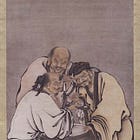
Part of:
Continuing from:
For full citations of abbreviated references, please see Introduction and Bibliography.
In the post Magnetism and Love, and the ones following it, the subjects of "magnetism" and healing were touched upon, that Gurdjieff seemed to have such expertise and knowledge in. Continuing now to look at Thomas de Hartmann's journey from the slavery of sweet things, to search, to struggle, to the confusion and danger of his illness, to regeneration and rebirth, as it were, and then to a new kind of sweetness as a result of work and suffering, magnetism plays an important role in guiding Hartmann and also of the saving his life - literally and in terms of the inner life.
The idea of the formation of a magnetic centre within a person, that guides and draws them towards "the way," is spoken of by Gurdjieff in the early teaching in Russia, as recorded by Ouspensky:
". . . the results of these [originally conscious] influences collect together within him and after a certain time they form within him a kind of magnetic center, which begins to attract to itself kindred influences and in this manner it grows. If the magnetic center receives sufficient nourishment, and if there is no strong resistance on the part of the other sides of a man's personality which are the result of influences created in life, the magnetic center begins to influence a man's orientation, obliging him to turn round and even to move in a certain direction. When the magnetic center attains sufficient force and development, a man already understands the idea of the way and he begins to look for the way . . .1
Before Thomas and Olga de Hartmann met Gurdjieff, they were "searching for a way to develop."2 Some kind of magnetism, one could say, was drawing them towards something very different to their sheltered and cosy life. Hartmann’s immersion in fairy tales as a child and the way their quintessence continued to guide him, was perhaps part of this.
Maurice Nicoll calls the magnetic centre "ears to hear,"3 and says,
You know that this Work can only begin with those who have Magnetic Centre—i.e. who are convinced that there is something higher than themselves.4




